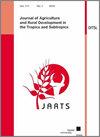Optimising beekeeping development programs for improved productivity, income and welfare: a case study of Papua New Guinea
Q3 Social Sciences
Journal of Agriculture and Rural Development in the Tropics and Subtropics
Pub Date : 2020-10-19
DOI:10.17170/KOBRA-202007291511
引用次数: 5
Abstract
Beekeeping can provide important sources of cash income for farmers in developing countries where land is unconducive to crop and livestock production systems. In many low-income countries however, attrition among beekeeping adopters remains a chronic problem, colony losses are high, support for and coordination of the sector is low, and practices, production and income from beekeeping is often inefficient. This study investigated the key drivers and practices influencing incomes from beekeeping, honey production and numbers of hives owned by beekeepers in the Eastern Highlands Province of Papua New Guinea. Survey data from 117 beekeepers revealed that beekeeping contributes to improving farmers resilience and security in times of financial hardship with 85% of beekeepers reporting using their honey as a form of a bank and beekeepers earning average annual net incomes of US$715.50. Specifically, our results highlight the importance of supplementary feeding, multiplying colonies by making splits, reinvestment into beekeeping enterprises and access to more than a single apiary site as key factors influencing productivity and income. This study provides guidelines for optimising beekeeping outcomes in low-income countries and provides recommendations to inform policy options for strengthening beekeeping for sustainable community development programs and partnerships.优化养蜂发展计划以提高生产力、收入和福利:以巴布亚新几内亚为例
养蜂可以为土地不利于作物和牲畜生产系统的发展中国家的农民提供重要的现金收入来源。然而,在许多低收入国家,养蜂人之间的磨耗仍然是一个长期问题,蜂群损失很高,对该部门的支持和协调很低,养蜂的做法、生产和收入往往效率低下。本研究调查了影响巴布亚新几内亚东部高地省养蜂人养蜂收入、蜂蜜生产和蜂箱数量的主要驱动因素和做法。来自117名养蜂人的调查数据显示,养蜂有助于提高农民在经济困难时期的抵御能力和安全性,85%的养蜂人报告称,他们将蜂蜜作为银行的一种形式,养蜂人的平均年净收入为715.50美元。具体来说,我们的研究结果强调了补充喂养、通过分裂繁殖蜂群、对养蜂企业的再投资以及获得多个养蜂场作为影响生产力和收入的关键因素的重要性。本研究为优化低收入国家的养蜂成果提供了指导方针,并为加强可持续社区发展计划和伙伴关系的养蜂政策选择提供了建议。
本文章由计算机程序翻译,如有差异,请以英文原文为准。
求助全文
约1分钟内获得全文
求助全文
来源期刊
CiteScore
2.30
自引率
0.00%
发文量
0
审稿时长
>36 weeks
期刊介绍:
The Journal of Agriculture and Rural Development in the Tropics and Subtropics publishes papers dealing with original research and review papers in the fields of plant production, animal nutrition and animal husbandry, soil science, rural economy and farm management, forestry and forest economy, veterinary hygiene and protection against epidemics.

 求助内容:
求助内容: 应助结果提醒方式:
应助结果提醒方式:


